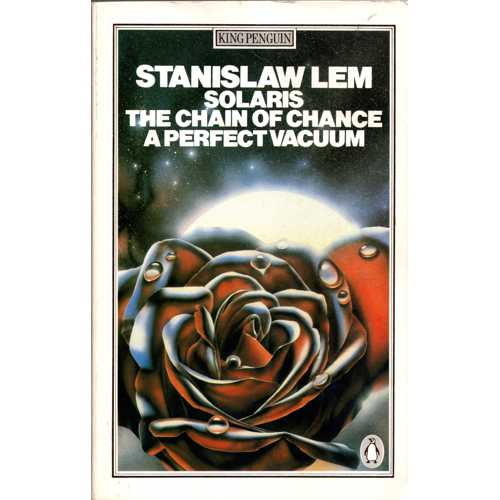
The first story, Solaris, was made into a 1972 film by Andrei Tarkovsky, which I watched at university when an undergraduate. The novella was largely in line with the film, with just a few minor changes; fortunately for the film, removal of the text's lengthy info-dumps were some of those minor changes. On the whole, I preferred the film (even if, at 2¾ hours, it was overly long); that might have been because I rather liked Natalya Bondarchuk, though. Given that I've seen the movie only once, and that was maybe 46 years ago, I should probably watch it again. Then it'll turn out that info-dumps were indeed present, but I excised them from my memory to spare myself trauma.
It's weird how someone can envisage a future that has a microscope powerful enough to see at the subatomic level, but still puts a vast library of actual books on a space station, and has recordings made on tape.
The second story, The Chain of Chance, is some kind of detective tale. It was bouncing along quite well, until I realised that there was no point in trying to figure out what was going on because it was bound to involve some kind of unforeseeable technology (which it did, in the form of a pharmaceutical weapon). That rather spoiled it. Detective stories are meant to be "Here's all the evidence, see if you can figure it out", not "Here's all but the one, vital piece of evidence you need to figure it out, you'll just have to wait until I choose to tell you it".
In addition to info-dumps, Lem does rather like to make statements in Latin.
The short stories were of an unusual kind, written as if they were reviews of books. It was a nice device, and a good way for Lem to introduce some of his ideas for novels without having to go to the bother of writing the novels. His propensity for info-dumps and Latin aside, they were generally interesting reads. This set of short stories was the very reason I bought the book, because I was recommended one of them, Non Serviam (Latin for "I will not serve", according to Google Translate). I can see why I was recommended it, as it has something to say about people who create worlds that contain intelligent beings, and how they should interact with said beings (spoiler: they shouldn't). I'd have referenced it in How to Be a God if I'd read it earlier. Of the other short stories, U-Write-It is probably the most apposite, envisaging as it does a world where anyone can write a story cobbled together from the words of people who can actually write stories. Welcome to the Kindle store.
Anyway, I'm glad I read the book as a whole.
Next up, I'm finally getting around to reading The Mote in God's Eye, which has been on my "I should probably read this" list since about 1976.